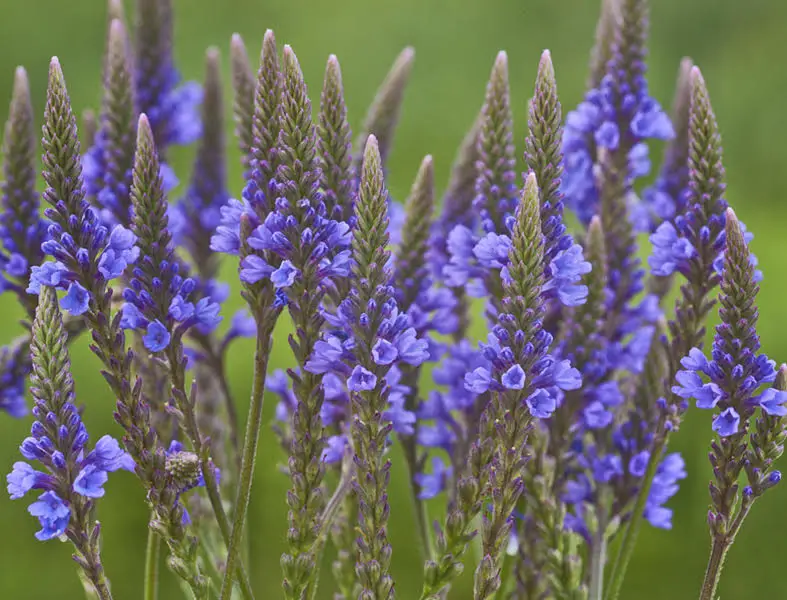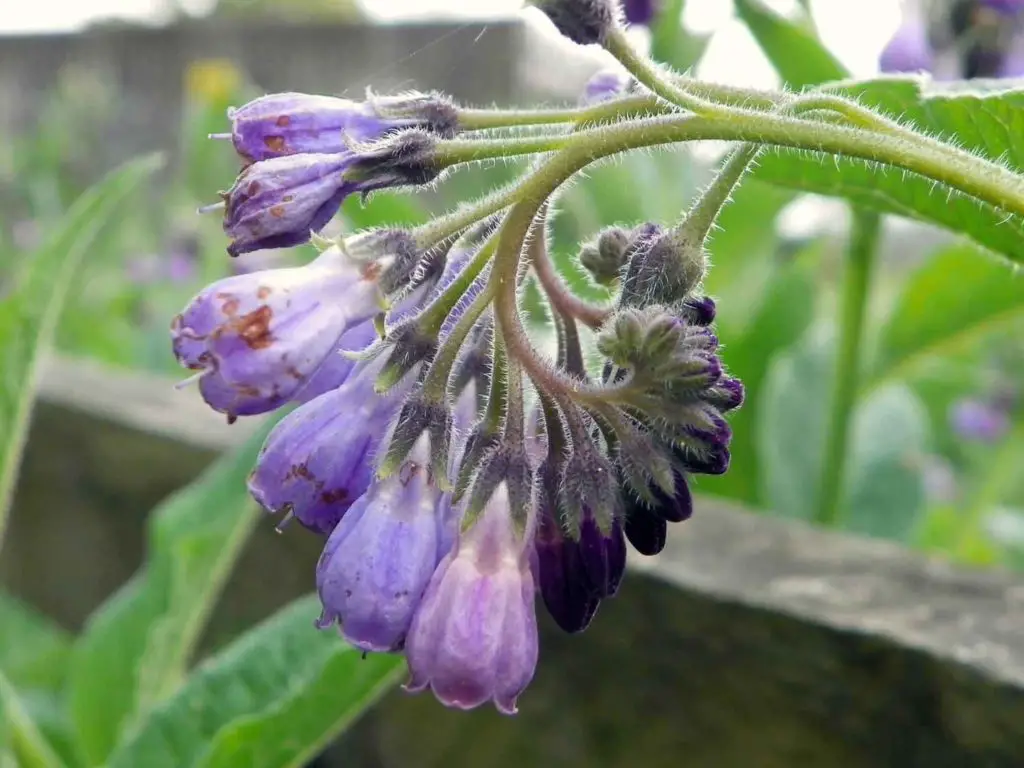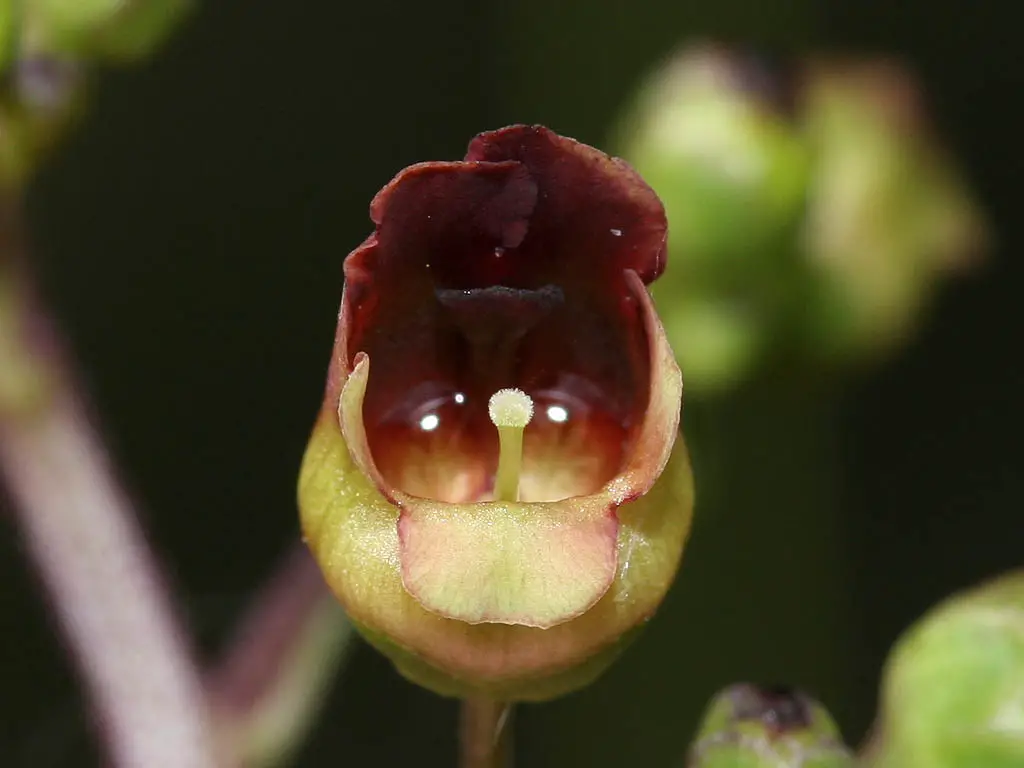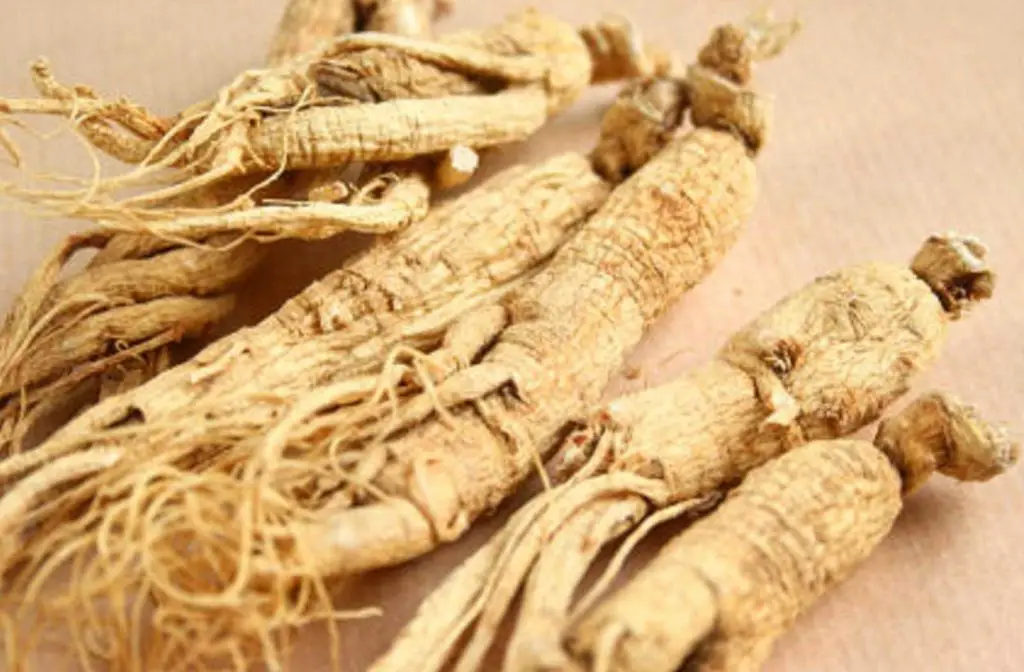What is Vervain?
Vervain (Verbena officinalis) is an herb well-known in folk medicine. Also known as herb of the cross, Simpler’s joy, herba veneris, and countless other names, Vervain is native to the Mediterranean region, but it has also spread to Asia and North America. Vervain grows to about a metre tall, and produces small leaves and “spikes” of small purple flowers, only a few of which are in bloom at any one time. The flowers are not fragrant.
Vervain was used in religious rituals in ancient Rome, hence its name verbena, from verbenae, the Latin word for any plant used ceremonially. Vervain was also used in ancient Greece and Scandinavia, and allegedly by the Druids. One explanation of the name Vervain states that it comes from the Celtic ferfaen, meaning to drive away a stone – that is, a kidney stone, testifying to one of Vervain’s many traditional uses. Vervain was considered a cure-all herb, but it was particularly used for depression and anxiety, indigestion, jaundice, gout, kidney stones, headaches, dysmenorrhea, and to stimulate childbirth and/or lactation. It was also used as an aphrodisiac, explaining its alternative name “herba veneris.” Few, if any of the traditional uses of Vervain have been confirmed by scientific studies, but Vervain is in the British Herbal Pharmacopeia and the Chinese Pharmacopeia.
It might taste awful but Vervain Tea might be worth it as it potentially has anti-tumor effects. Get it => https://t.co/2ghzK13yxN
— MedicinalHerbals (@MedicinalHerbal) March 1, 2017
Vervain Benefits and Uses
Despite Vervain’s longstanding use in folk medicine, it has not received much scientific attention. There are very few human studies to date. Animal and in vitro studies are scattered, focusing on many different areas of research. However, a few potential uses are known, resulting from the active compounds verbenalin, hastatoside, and verbascoside, which is a compound also found in other medicinal plants. The following are the main areas in which Vervain has been studied:
Topical anti-inflammatory
One study used a topical preparation of Vervain to treat induced edema in mice ears and paws. It was found to be moderately effective.
Antimicrobial activity
Vervain has varying levels of antimicrobial effects. Verbascoside was found to have antiviral activity against vesicular stomatitis virus. A flavonoid fraction of Vervain inhibited the growth of several strains of bacteria. Lastly, the essential oil of Vervain was observed to inhibit the growth of Clostridium botulinum spores.
Treating colic
One study tested the effects of an herbal tea on 68 babies suffering from colic. The tea contained Vervain, chamomile, licorice, fennel, and lemon balm. One half cup was administered per colic episode, up to three times a day. While this study found the herbal tea effective, its efficacy cannot be attributed solely to Vervain.
Anti-tumour effects
Several small in vitro and in vivo experiments have demonstrated anti-cancer effects from Vervain. Verbascoside was found to differentiate a human adenocarcinoma line into a less malignant variety, and in another case caused apoptosis in a gastric cancer cell line. Additionally, the compound citral, found in Vervain essential oil, was found to induce apoptosis in chronic lymphocytic leukemia. Phenylethanoid glycosides from Vervain also reduced the proliferation of a colon cancer cell line. One mice study showed that Vervain appeared to have an anti-tumour effect without compromising immune function.
To combat gingivitis
In this study, 260 patients with gingivitis brushed and flossed their teeth, while half of the group also used a mouthwash made with Vervain. The patients were tested at days 0, 14, and 28 for plaque and gingivitis. While both groups showed increases in oral health, the Vervain group did significantly better, revealing that the mouthwash had “good clinical results.”
Treating sinusitis
A product popular in Germany containing Vervain, gentian root, primrose, sorrel, and elderflower is used to treat sinusitis along with traditional antibiotics. The combination of herbs is supposed to increase mucus drainage.
How to take Vervain?
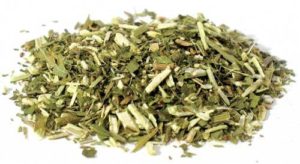
Vervain is most commonly consumed as a tea or tincture. However, Vervain tea is considered unpleasant to drink because of its strong bitter taste (unless it is being used as a “bitter” to stimulate digestion, in which case this is a benefit). Occasionally, Vervain can be found blended with other herbs into teas. Because of the taste, it is often recommended to take Vervain as a tincture instead. This way, small amounts can be blended into other beveragesto mask the bitterness.
Vervai n Dosage Information
There is no clinically confirmed effective dosage for Vervain. However, a traditional dosage for tea recommends steeping 2-4g of the dried leaves and flowers in 500ml of water for 10-15 minutes. Three cups a day of this tea can be taken by adults. If you are using a tincture, 5-10ml can be taken three times a day.
Vervain Side Effects, Toxicity and Safety
There is very little safety or side effect information on Vervain. Verbenalin is considered toxic in high doses, and is a potential abortifacient, so Vervain should not be used by pregnant women, despite its historical use during pregnancy. Nevertheless, Vervain has been given to infants safely, so it is likely that moderate doses will not cause any dangerous side effects in non-pregnant individuals. It is possible that Vervain could cause nausea and vomiting because of its history of use as a purgative.
Additionally, Vervain can interact with some high blood pressure and anticoagulant medications. Be sure to consult with a doctor to make sure Vervain is safe for you to use.
Buying the Best Vervain
Unlike other herbal supplements, Vervain is usually not found as a tablet or supplement, and the mechanisms of its active compounds are not well understood. Therefore, looking for supplements with a certain percentage of active compounds (for example, verbenalin) may not be the best route to take. Often, specific percentages are not mentioned on the label at all. Teas containing Vervain, or tinctures from reputable companies are likely to be safe for use and easily available.
Some other Verbena species, such as Verbena hastata (blue Vervain) and Verbena macdougalii (MacDougal verbena) can be used interchangeably with Verbena officinalis. Verbena hastata, especially, is an alternative that is commonly found in North American markets. It may be easier to find than common Vervain, and has many of the same effects.
References:
http://www.pfaf.org/user/Plant.aspx?LatinName=Verbena+officinalis
https://www.ncbi.nlm.nih.gov/pubmed/26824082
https://www.ncbi.nlm.nih.gov/pubmed/24146482
https://www.ncbi.nlm.nih.gov/pubmed/20074474
http://www.uofmhealth.org/health-library/hn-2180001
http://cdn.naturaldispensary.com/downloads/Blue_Vervain.pdf

